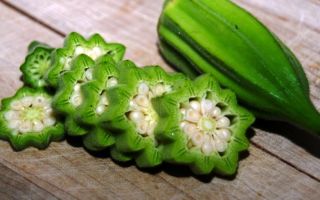Content
Okra is an unusual vegetable that has only begun to spread in Russia in recent years. Okra has many valuable properties and can be used both in cooking and for treatment.
What is this vegetable "okra"
Okra, or okra, is a vegetable from the Malvov family. In Russia, it can be found in stores and markets not too often, so it is interesting to know how it looks and what conditions it prefers.
What does okra look like
The herbaceous annual okra is a plant that grows on average about 50 cm in height. The main stem of the okra is thick, strong and branched, covered with light green large leaves, five or seven lobed, with slight pubescence on the surface. The flowers of the plant appear in spring almost close to the stem, in the leaf axils. Pedicels are very short and pubescent, and the flowers themselves are large, solitary, yellowish-cream in color.
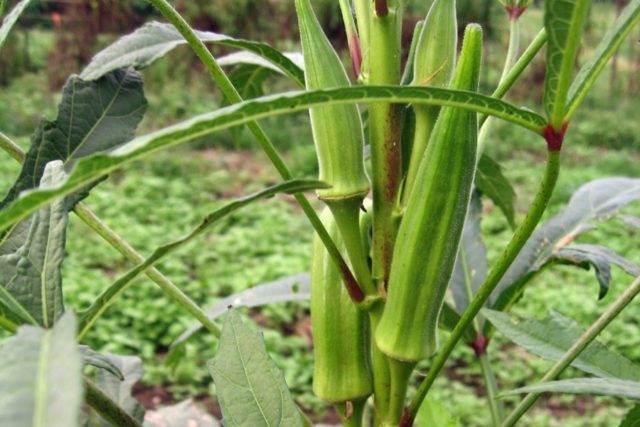
Okra fruits also form in the leaf axils. They look like elongated pyramidal boxes, slightly resembling green peppers. In length, the fruits can reach 25 cm, from above they are covered with small fine hairs. Okra bears fruit from August to November, so it makes sense to look for it in stores in the fall.
Where does okra grow
Under natural conditions, okra grows in India, Africa and in the southern regions of North America. But it is artificially cultivated in European countries and in Russia, for example, in the Stavropol and Krasnodar regions. Cultivation of okra is associated with certain difficulties, since exotic okra is used to growing in the tropics and reacts sensitively to cold snaps.
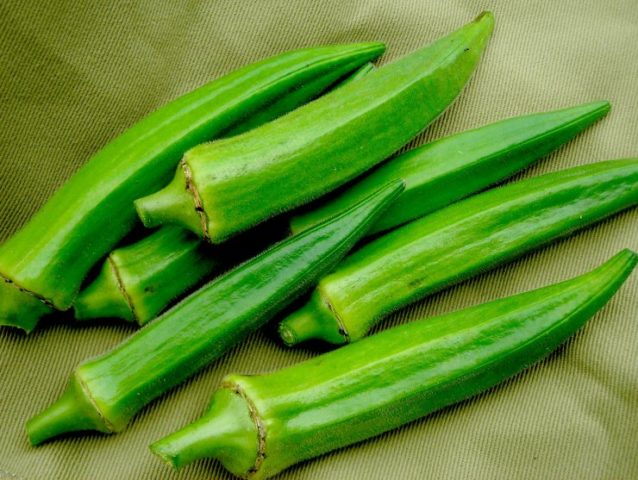
What does okra taste like?
The taste of the product is quite original. Foodies say that okra tastes most like young eggplant or zucchini with asparagus bean flavor.
The value and composition of vitamins in okra
Okra is highly prized in culinary and other fields. The reason for this is its varied and useful chemical composition. The fruits of the plant contain:
- vitamins B6, B5, B9, B1 and B2;
- vitamins A and K;
- tocopherol and vitamin PP;
- choline and beta-carotene;
- vitamin C;
- calcium and potassium;
- iron;
- cellulose;
- silicon and phosphorus;
- manganese and copper;
- zinc;
- ash.
Okra predominantly consists of carbohydrates, about 7 g in a portion of the product per 100 g. Another 2 g is occupied by proteins, and only 0.1 g in the composition is allocated to fats.
Calorie content
There are 31 kcal per 100 g of fresh okra.Okra is completely harmless to the figure and is considered very useful in dietary nutrition, it does not provoke weight gain, but effectively helps to get rid of toxins.
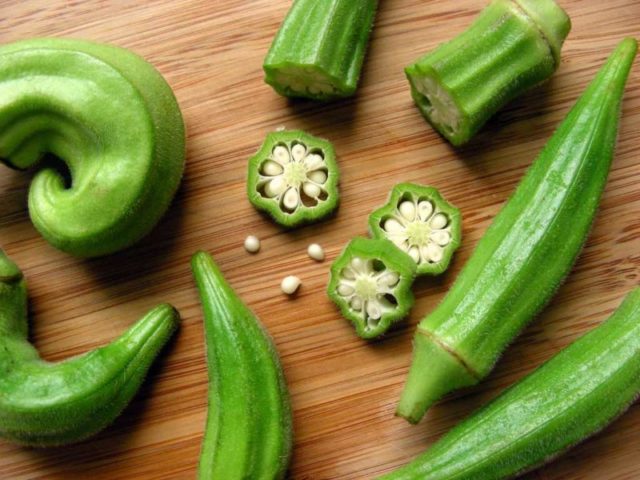
How is okra useful?
Okra has numerous properties that make it valuable for dietary and medicinal use. Namely:
- improves the overall tone of the body and helps fight chronic fatigue;
- prevents the development of depression;
- has a beneficial effect on the respiratory system and is beneficial for asthma;
- regulates blood sugar and helps maintain proper metabolism;
- protects eyesight and helps to heal eye inflammations;
- regulates the vascular system and equalizes the pressure in hypertension.
- improves the work of the reproductive system in men and women.
In particular, there are several health benefits of okra when consumed.
During pregnancy
The composition contains a large amount of folic acid. Therefore, okra is recommended for use for pregnant women, especially in the early stages. Okra not only saturates the woman's body with vitamins and valuable minerals, but also contributes to the correct development of the baby. Folic acid is responsible for the normal formation of the brain and nervous system of the embryo and reduces the risk of intrauterine abnormalities.
The benefit of okra for pregnant women is that it is not possible to gain weight by using okra. Considering that during the period of carrying a child, many women manage to acquire extra pounds due to the changed diet, this point is quite important.
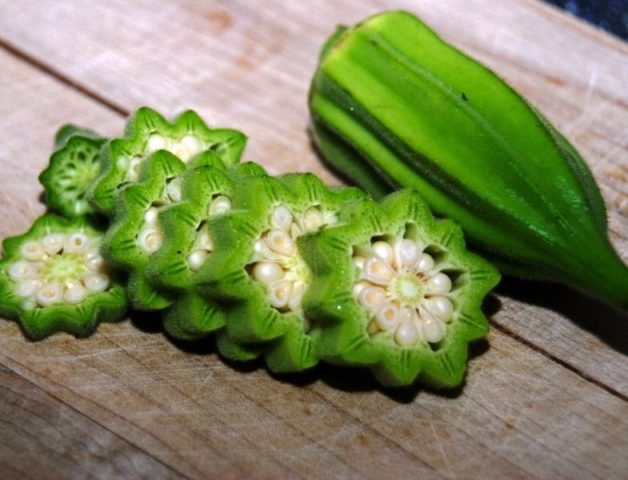
With oncology
Okra fruit contains glutathione, a tripeptide that is involved in the body's detoxification processes. The beneficial substance helps to remove waste products from tissues and prevents the growth of free radicals. In addition, glutathione improves the recovery of natural antioxidants - vitamins C, D, E and A.
With regular use of okra against cancer, the likelihood of developing cancer decreases. With existing tumors, it is useful to include the okru in the diet with the permission of the oncologist, it has an additional therapeutic effect. It should be remembered that okra cannot be the only cure for cancer; it should only be used in combination with traditional treatment.
For the digestive tract
Okra contains high amounts of fiber and has anti-inflammatory and hepatoprotective properties. It is useful to use okra:
- with gastritis and peptic ulcer;
- with acute and chronic hepatitis;
- with pancreatitis and diseases of the gallbladder and biliary tract;
- with colitis;
- with fibrosis and even cirrhosis of the liver.
Okra effectively fights bacterial and infectious processes in the digestive organs and quickly improves well-being. Its healing and anti-inflammatory properties are in demand in the treatment of hemorrhoids and rectal fissures. Okra is also used for dysbiosis, a tendency to diarrhea or constipation, useful okra improves metabolism and helps to improve digestion.
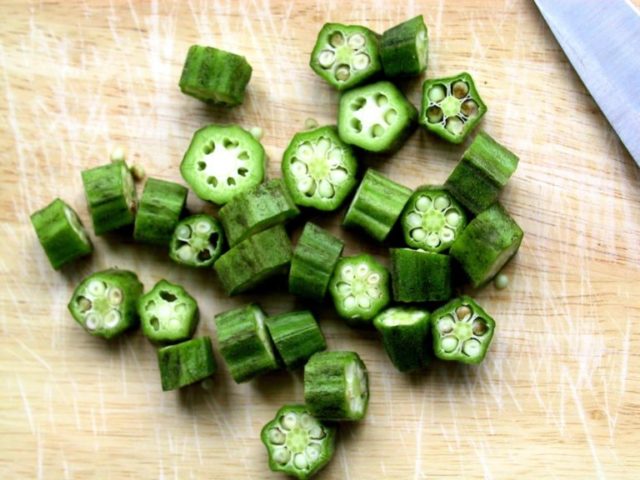
For the heart and blood vessels
Okra in any form is very useful for the heart and blood vessels; it contains many antioxidants and other substances responsible for the good functioning of the circulatory system. The use of okra has a positive effect on diabetes mellitus, high cholesterol and a tendency to heart ailments.
Okra speeds up blood circulation and improves the supply of oxygen to the brain, therefore, against the background of its presence in the diet, attention and concentration increase. Okra is useful for preventing not only strokes and heart attacks, but also Alzheimer's and Parkinson's diseases.
For the respiratory system
Vitamin C and other valuable substances in okra make it very useful for the treatment of respiratory ailments. Fresh okra, as well as infusions and decoctions based on it, are used for bronchitis and tracheitis, for coughing and laryngitis, for asthma. Okra has not only an anti-inflammatory, but also an expectorant effect; in case of a cold, it is especially recommended to use it with a dry cough for the prompt removal of sputum.
Okra application
The exotic vegetable okra is used in several areas, in cooking, as well as for healing and personal care. The valuable properties of okra are of great benefit to the body when used internally and externally.
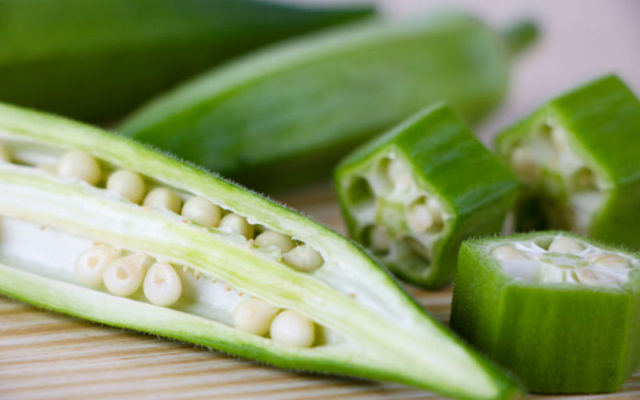
In folk medicine
The therapeutic benefits of okra are recognized, among other things, by mainstream medicine. Research confirms that the product does indeed help fight a number of ailments. You can use okra:
- for cancer and for the prevention of neoplasms;
- with diabetes mellitus and metabolic disorders;
- with cataracts and other eye diseases;
- in case of malfunctions of reproductive functions in men;
- with diseases of the respiratory system;
- with atherosclerosis;
- with pressure surges.
Decoctions and infusions recipes
Despite the fact that okra in any form has medicinal properties, for certain diseases, special medicinal products are prepared from it. The concentration of nutrients in them is increased, respectively, and they bring a valuable effect faster.
For colds and coughs, it is useful to use an infusion of okra with honey. They do it like this:
- fresh okra roots are crushed in a volume of 2 large spoons;
- raw materials are poured with 3 glasses of clean warm water;
- leave for 2 hours, then filtered through cheesecloth.
The okra can be sweetened with a small spoonful of honey to improve its taste and health. Take an infusion of okra, 1 large spoonful, 6-8 times a day until the symptoms of the common cold subside.
For stomach upset, constipation and diarrhea, an okra decoction is beneficial. According to the recipe, you need:
- pour water over a few mashed okra pods;
- add a few drops of lemon juice;
- put the saucepan on the stove and simmer over low heat until the substance thickens.
Use the product in 1 spoonful before each meal, okra helps to speed up digestion and regulate the process of removing toxins from the body.
In cooking
Most often, okra can be found in national dishes of Asian and African cuisine. In European and Russian cooking, it is used much less often due to its low distribution.
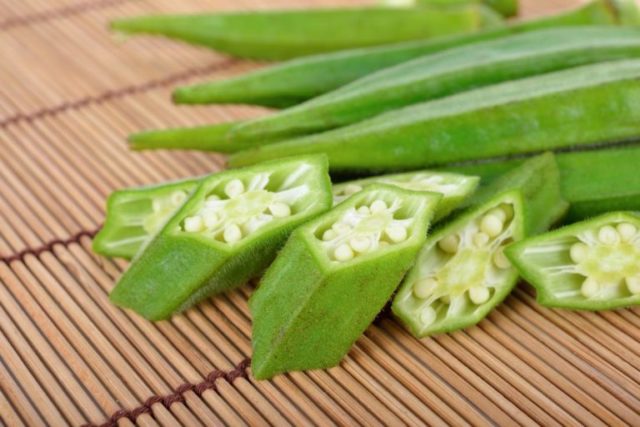
Recently, however, the interesting taste of okra has attracted the attention of chefs and gourmets. Okra is used in the kitchen:
- fresh;
- for blanching;
- for canning with marinade and salt;
- for stewing and frying, including deep fat.
Okra fruit goes well with most spices and herbs, mushrooms and vegetables, cereals, meat and fish. Okra is used in the preparation of first courses; when boiled, it not only remains tasty, but also acquires a slimy consistency inside, which is good for the stomach.
In Asian countries, on the basis of okra seeds, they prepare an invigorating drink gombo, which is similar in properties and aroma to coffee. At the same time, there is no caffeine in the drink, which makes it more harmless to the body.
In cosmetology
Okra shows its beneficial properties, including when applied externally. With the help of okra, you can fight dry skin and hair loss, it has a beneficial effect on the epidermis, strengthens the hair follicles, and helps to increase the volume of curls.
Plant based remedies:
- Hair balm.To restore healthy shine, strength and obedience to curls, you can prepare a natural balm. Several okra pods are crushed, boiled for half an hour, and then the slimy broth is filtered. Add a few drops of fresh lemon juice to the finished product and stir. Apply the gel to your hair immediately after washing; with regular use, okra will help restore tone to the strands.
- Face cream. You can use okra to nourish and moisturize your skin. The easiest way is to squeeze some fresh okra fruit juice and add to your regular day cream. If you use the enriched product daily, the skin will quickly stop peeling, and the problem of acne and blackheads will disappear.
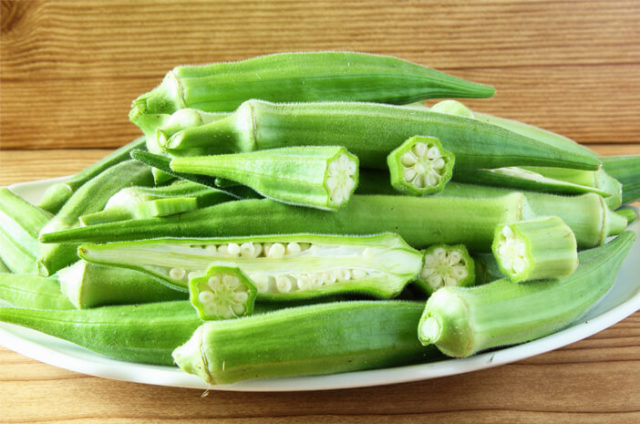
When losing weight
Okra's properties are highly regarded by nutritionists. An exotic vegetable contains a lot of fiber, but its calorie content is very small. Therefore, weight gain when using okra does not occur, but the metabolism begins to work much better, and toxins do not linger in the body.
Okra is recommended to be consumed not only on a diet, but also for obesity, as well as for a sedentary lifestyle, for the prevention of constipation. Because okra dampens appetite, you can eat a couple of vegetable pods half an hour before you eat, which will help you get by in smaller portions. Okra is very handy as a quick and healthy snack when you are on a busy daily schedule.
Contraindications to taking okra
While the benefits of okra are undeniable, under certain circumstances, an exotic fruit can do harm to:
- The main contraindication for okra is individual intolerance. Interestingly, an allergic reaction occurs not only when eating the fruit. Thin hairs that cover the pods of okra can provoke negative consequences.
- They should not be allowed to enter the body, and moreover, with sensitive skin, it is dangerous to even touch them with unprotected hands. Before eating okra, you need to grab the vegetable by the stalk and rub the pod with a hard cloth. This will remove the hairs from the surface of the okra and make it safe.
In addition to individual fruit intolerance and hair allergy, there were no other contraindications for okra. However, nutritionists advise to consume it in moderation, if okra is eaten in too large portions, this can provoke diarrhea.
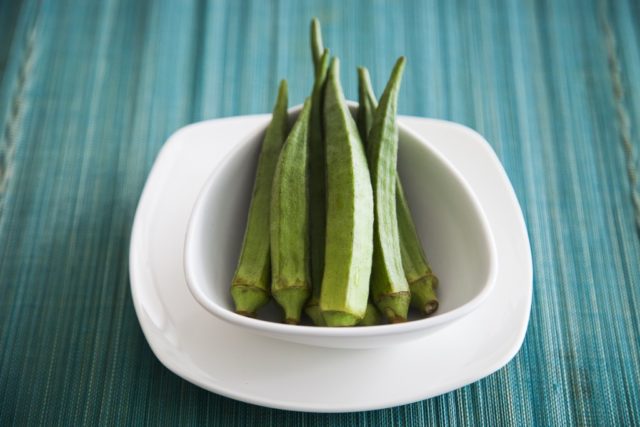
Selection and storage rules
Since okra has appeared on store shelves relatively recently, not everyone knows how a fresh vegetable should look.
When choosing okra, you must carefully examine the product. The pods must be:
- elastic to the touch, without dents and rotten barrels, with soft hairs on the surface, if there is no pubescence on the skin, then the okra is overripe;
- juicy green or slightly reddish, depending on the variety - without yellowness and brown shades.
Okra pods are usually about 10 cm long.
The shelf life of okra is very short. In the vegetable compartment of the refrigerator, it remains fresh for only 3 days, so it is best to cook it immediately after purchase.
Interesting facts about okra
If in Europe and in Russia okra began to gain popularity quite recently, then in hot tropical countries it has been famous for thousands of years. According to historians, okra was constantly present at the dinner table of Queen Cleopatra, and this Egyptian ruler was very concerned about her attractiveness and paid great attention to her diet.
There are also claims that the famous Russian writer Anton Chekhov respected the okra. He not only consumed okra, but also personally raised it on his personal plot.According to legend, it was Chekhov who gave okra one of the unofficial names - "ladies' fingers".
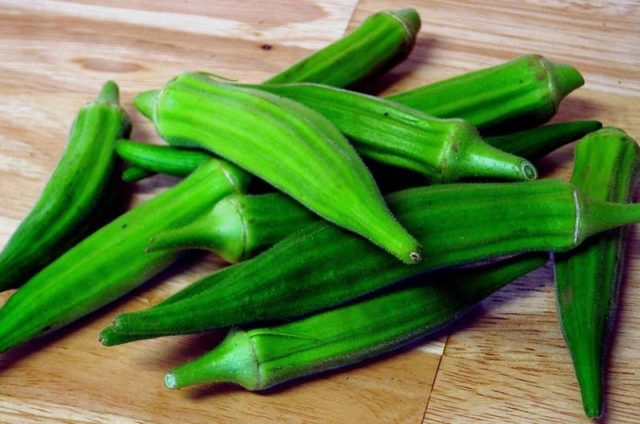
Conclusion
Okra is a tropical vegetable that has only recently begun to spread in Europe and Russia. It has many useful properties, is used, among other things, for treatment, with its help you can take care of external attractiveness. It is interesting that okra has practically no contraindications.

